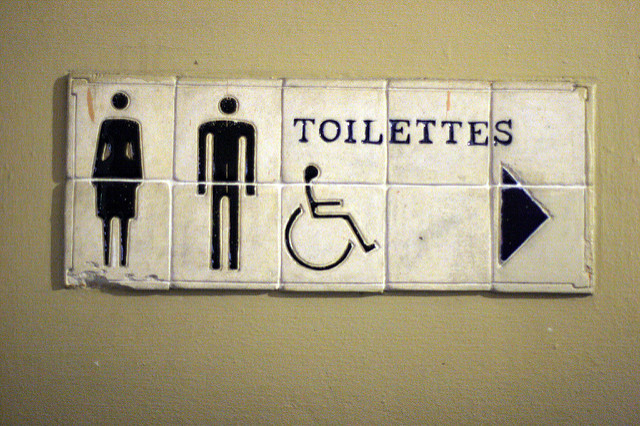Finding Les Toilettes In French Posted by John Bauer on Aug 2, 2017 in Vocabulary
Sometimes you learn des nouvelles expressions (new phrases) not because you want to sing a song or cook a meal, but because you simply need something. It can be as small as needing to know how to buy a battery or as important as knowing how to call les urgences (emergency services). Living a normal life in another language is a constant learning experience.
Satisfying basic needs often requires more than just le vocabulaire (the vocabulary), you have to know how to use the word correctly as well. Après tout (after all), memorizing a word and saying it when you really need it are two different things. I learned this lesson the hard way one day when I needed to find the bathroom.
Asking “where is the bathroom?” is une expression (a phrase) that will be at the beginning of any guide touristique (tourist guide). It is also something that everyone who plans on visiting la Francophonie should learn how to say!
La première fois (the first time) I needed to ask this important question, I made une faute (a mistake). The person I asked understood me and still led me to my destination, but I left the exchange feeling embarrassed.
I was au café avec mes amis (at a café with my friends) and after learning about le pastis and keeping eye contact while toasting, I needed to find les toilettes (the bathroom). I knew that the word for bathroom or restroom was les toilettes, but I thought, since it was un petit café (a small café), there probably wasn’t more than une toilette.
I ran through les conjugaisons (the conjugations) for être (to be) before I got up, making sure I know how to conjugate the verb properly for the singular toilette.
Je suis
Tu es
Il/elle est
Nous sommes
Vous êtes
Ils sontI am
You are
He/she/it is
We are
You are
They are
I was sure that the right conjugation for une toilette was est, which meant it was time to ask la question:
Où est la toilette ?
Where is the toilet?
Le barman (the bartender) instantly corrected my grammar before pointing me in the right direction:
Où SONT les toilettes.
Where ARE the toilets.
I thanked him for his help and was glad he pointed out la faute, but as I made my way to les toilettes I made sure to remember that it doesn’t matter how many toilettes there are aux toilettes (in the bathroom). In French, les toilettes sont au pluriel (the bathroom is in the plural)!

Build vocabulary, practice pronunciation, and more with Transparent Language Online. Available anytime, anywhere, on any device.





Comments:
Tim:
An important reminder. At least you didn’t make the mistake I made the first time . . . asking for la salle de bain in a restaurant!
Prochy Master:
I think there are some typing errors in the spelling of ‘nouveaux’ and ‘urgences’. Also don’t the French say ‘de nouveaux expressions?’ (and not des).
John Bauer:
@Prochy Master Vous avez raison (you are right)! I had a few fautes de frappe (typos) in there. It should be nouvelles to match the feminine expressions. However, the article des is fine here. I’ve corrected the typos, but thank you for pointing them out 😀
Merci pour votre commentaire !
Liz W.:
Est-ce qu’on utilise plus le terme “le WC” desormais?
John Bauer:
@Liz W. Apparemment oui ! Personnellement je n’ai pas beaucoup entendu le terme, mais ça se dit toujours.
Cependant on dit les WC et on prononce “WC” comme “vé cé”.
Bill Penn:
Since I am 91 years old and have not studied nor practiced French for over 40 years, it may be presumptious of me to atempt to correct what appear to be errors in your text, but I would have written “des nouvelles phrases” and “les urgences”. The former may be just one of those changes that occur in all languages over time and the latter is obviously a “typo”
John Bauer:
@Bill Penn Merci pour votre commentaire ! Don’t worry about sounding presumptious, that’s how we all learn 😀
I fixed la faute de frappe (the typo) earlier, but the difference between une phrase in French and a phrase in English makes it something of a false friend.
In French, une phrase is more simply just a sentence rather than the “set expression” meaning it has in English.
I hope that clears it up for you, Bill!